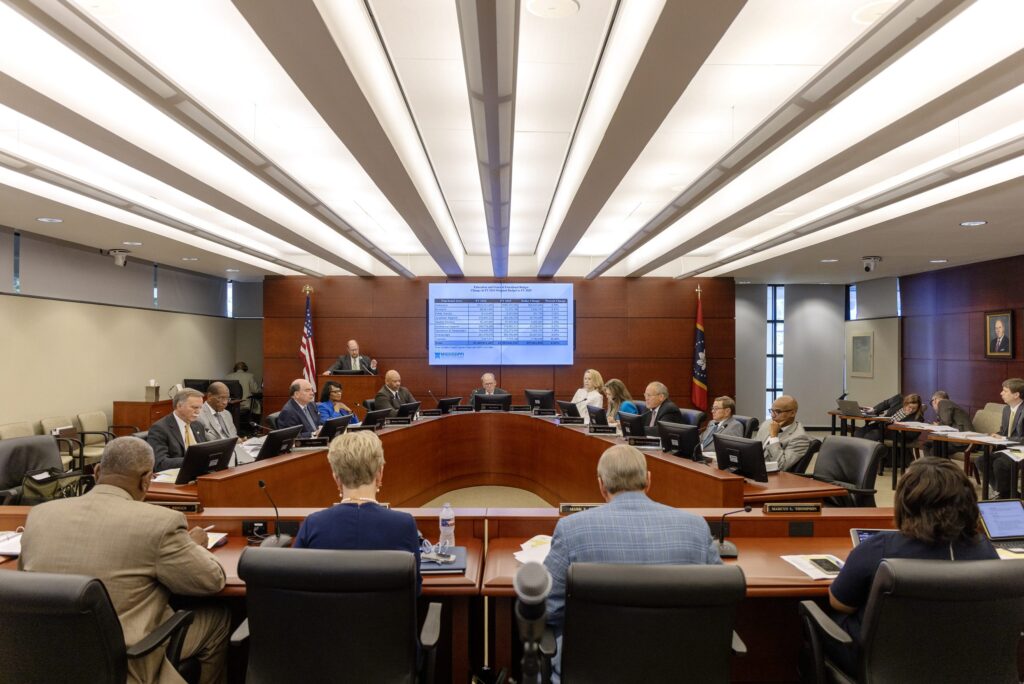Mississippi's two public university presidents currently each make nearly $1 million a year, while faculty salaries at the state's eight universities remain stagnant.
Most of these big salaries are due to the private foundations of the University of Mississippi and Mississippi State University subsidizing the state salaries of Glenn Boyce and Mark Keenum, respectively, but not all of them.
According to IHL board meeting minutes, the two presidents currently earn $950,000 a year, with $500,000 of that covered by taxpayers and the rest by the foundation.
That's the equivalent of a $100,000 raise. This was received by Keenum and Boyce after the Board of Regents of Higher Education conducted a performance evaluation of both presidents late last year, spokesman John Sewell said in an email.
“College presidents play a vital role not only at their individual institutions but across the state,” Sewell wrote. “Mississippi's public university system is expected to have an $8 billion impact on the Mississippi economy over the next six years.”
The committee also reviewed Nora Miller, president of the Mississippi University for Women, who did not receive a raise and it is unclear whether she asked for one, but will continue to receive a $300,000 salary plus a $5,000 grant from the foundation under her new four-year contract.
According to IHL board records, the state paid Miller $215,000 and she received a $30,000 foundation grant when she was hired in 2018. In 2022, the board gave pay raises to all university presidents and reduced foundation grants to $5,000 for all universities except the University of Mississippi and Mississippi State University.
Last month, the board also approved significant “retention” plans for Boyce and Keenum, a type of bonus paid by the university foundation that no other university president in Mississippi receives. Keenum will have the opportunity to receive up to $1.4 million from the Michigan State Foundation if he stays at Mississippi State through the end of his contract in 2028, and Boyce can receive up to $800,000 from the Ole Miss Foundation.
It's unclear whether either president plans to retire or leave the university. Mississippi taxpayers pay big bucks to university presidents, but the board keeps salary decisions secret.
Sewell did not answer further questions about the purpose of the plan, saying “information regarding specific evaluations or salary determinations is a personnel matter and is considered confidential.”
Documents obtained by Mississippi Today last year outlined the criteria the board used to evaluate the eight university presidents as of January 2023, including “demonstrating effective leadership in enrollment management,” “supporting initiatives and programs that promote student retention” and “demonstrating effective leadership in obtaining and maintaining regional and specialty accreditation.”
Under Keenum's leadership, the National Science Foundation has ranked Mississippi State University as a top research institution, and Boyce's Now and Future Campaign has raised more than $1.5 billion in private support for the University of Mississippi.
“I am extremely grateful to the IHL Trustees, Chairman Rankins and the members of the University Foundation Board of Trustees for their confidence in my leadership,” Boyce said in a statement. “More importantly, I know that our university thrives because of the tireless efforts of our faculty and staff to fulfill our mission of teaching, research, service and care every day.”
The IHL Board of Trustees first approved Boyce's retention allowance in 2022. When the Board of Trustees gave Keenum that opportunity in 2021, he asked the Mississippi State University Foundation to “use a majority, if not all, of this incentive for a scholarship.”
MSU spokesman Sid Salter declined to answer questions about whether the foundation used Keenum's retention allowance to fund a scholarship.
“The portion of these compensation packages that may have relied on private Michigan State University Foundation funds is not required to be disclosed beyond what the College Board has already provided,” Salter wrote. “The university has no further comment.”
The IHL board also announced its legislative priorities for next year, including increasing salaries for faculty members who earn below average compared to their peers at other southern universities.
According to an analysis of federal data, the average teacher's salary in Mississippi has been reduced by nearly $11,000 due to inflation since 2016. As of fall 2022, the average teacher salary in Mississippi was $68,676.
While IHL has achieved nominal wage increases for faculty and staff, inflation and rising health insurance costs have made real pay increases impossible, the board said.
read more: “USM's new president gets $650,000 salary; all public university presidents get raises this year.”

